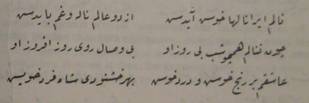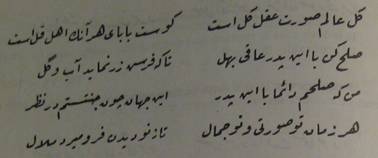




 Erkan Türkmen
|
Selçuk University First International Mevlâna Congress
3-5 May 1987
RUMI AS A TRUE LOVER OF GOD
Dr. Erkan TÜRKMEN
The Mathnawí of Rumi is throughout a love letter to God. In this remarkable work, Rumi narrates all the mystical states he experienced himself during his spiritual ascension. In his first eighteen verses [1] he points out these stages as follows:
1- Need (searching for the daily bread for spiritual hunger)
2- Choosing of path (materialistic i.e. poison; spiritual i.e. antidote).
3- Desire and yearning (like fish and water).
4- Unveiling of some states (i.e. tearing of veils).
5- Love and devotion (like Majnun and his beloved Leyli).
6- Observing God in every phenomenon (i.e. soul and body).
7- Unification of purpose (reaching the Origin). [2]
In this paper we shall take the fifth stage i.e. his love and try to see how we experienced it. However, it is not easy to put Rumi's love in words as it is above the faculty of earthly languages as he says:

I have narrated love in brief but not in details, for both my perception [3] and tongue have burnt away.
(M. I, verse no. 1758) [4]
Generally speaking, his love has the following major characteristics:
1- His love depends on sacrifice and patience, but not on personal expedience.
2- Reason is helpless and weal in front of love's power.
3- Love is eternal and infinite.
4- Love is above belief and disbelief.
5- The Beloved is passive while the lover (man) is active.
6- There is no fear of time and death in true Divine Love.
1- Rumi like all other Sufis refused to live a rich life, although he was highly respected by the Selçukian Sultans. Today we see ruins of the Sultans' palaces and castles but we see no traces of Rumi's villa because his home was in the heart of people. He devoted his fame and possession in the way of Love. He, therefore suggests others to do so by lessening their sensual desires. At the beginning of his Mathnawí he says:

How long will you be the captive of gold and silver, so break your fetters and be free, my son.
(M. I, v.19)
His love was not egoistic, but sacrificing like that of Majnun:
![]()
The reed talks about the bloody path and tell us the tales of Majnun's love.
(M. I, v. 13)
He continues:
![]()
A lover's food is the bread of love, not this (ordinary) bread, he who is a true lover is not a slave of existence.
(M. III, v. 3020)
To reach other stations that lead to God, one has to minimize one's needs and provide them for others. In this way we train our greedy selfness. He who claims to be the lover of God and fails to sacrifice his own will for the will of God, cannot be promoted to other stations. It is love by which we control our worldly desires and gain real knowledge (i.e. gnosis).

If you are able to control your selfness for a while, you can obtain the knowledge of all prophets and can begin to observe in your mirror of comprehension the face which the whole universe is looking for.
(Divan, p. 1390) [5]
The lover of God does not seek for the pleasure of this world. As he has lost the vicinity of his Beloved, He must mourn and wail like the reed. Rumi expresses such feelings in his following verses:

I wail because wailings are pleasant to Him, He wants wailing and grief from the two worlds. Why shouldn't I cry like a night without its day, failing to see His face that illuminates a day. I love my grief and pains just to please my only King (God).
(M. I, v. 1775. 1776. 1777)
Finally, when Rumi cannot reach his sublime Beloved he tries to sooth himself, patiently, with what he has in hand :

In the memory of Thy lips I kiss the red-diamond (of my ring),
Since I cannot reach Your lips, I kiss this,
As I have no access to Your sky (Your height),
I prostrate down [6] and kiss the earth.
(Divan, p. 1419)
2- Rumi's love knows no bounds of wisdom, because love can not be encaged within the domain of logic. The human logic is nothing more than a tiny drop in the sea of Divine Mercy. Love and its charm is above conception. He says:

None other, but he who has lost his (worldly) senses can comprehend the feelings of love and it is the ear that receives what tongue utters.
(M. I, V. 14)
So to understand and appreciate Rumi's romantic verses one has to posses spiritual heart. Love can be explained only by languages of love. As he says:

The ailment of a lover is of a different kind, while love is the astrolabe [7] of mysteries of God. Reason is like an ass stuck in mud but it is only love that can comment on love and lover-hood.
(M. I. 110, 115)

It is love that is reckless but not intellect, reason looks for what is profitable (for ego).
(M. VI, v. 1967)
Mental power is the slave of forms and colors. Anyone who is fond of colors and outer beauty may get stuck:

The love that depends on colors (and shapes) is not true love, it finally ends up in disgrace.
(M. I, v.205)

The Beloved has no form, may it be the beloved of this world or of that if you have fallen in love with a figure, then why do you leave it when it dies; the shape is there, so why have you been fed up of it; O' lover so seek for the real Beloved.
(M. II, v. 701)
It is the reason that deceives a man and keeps the realities unveiled, as Rumi says:
![]()
When His decree and predestination arrives, the watching reason becomes giddy-headed and good for nothing.
(M. V, v. 2166)
Again, Rumi explains how an individual reason is weak and helpless as compared to the universal reason in the following lines:

All the universe is the reflection of the universal reason, because it is the father of the believers of the word say [8]; so make peace with this father so that you may see the clay and water [9] as a bed of gold. Since I have made peace with this father, all the world is like a paradise to me. At every moment, there appears a new form and a new beauty; and thus by watching each new vision my pains die away.
(M. IV, 3259, 3261, 3263, 3264)
It is the power of love that ends the spell of reason and one begins to observe realities beyond the outer forms:
![]()
If you, my friends, pass beyond forms, there is a paradise and rose garden within rose garden.
(M. III, v. 577)
Rumi advises us not to seek the apparent charm of objects, but to look for the Oneness of beauty:

So long as you are worshipper of forms, they look double; but when you free yourself from individuality you find them all one.
(M. I, v. 679)

In things spiritual there is neither division nor numbers,
In things spiritual there is neither partition nor individuality.
By means of grief, melt the obstinate forms,
Then you see the Unity that lies under it like treasure.
(M. I, v. 681, 683)
It was this talent of Rumi which enabled him to discover what lied behind the corporal frame of Shems-i Tebrizi, Selahaddin and Husâmuddîn Chelebi.
3- Divine Love is eternal and infinite. It is above any limits and ties, regarding this Rumi says:

Love cannot be explained and heard, it is like a sea without dept. As one cannot count drops of ocean, so seven seas are like a tiny sea in front of love.
(M. V, v. 2732-33)
and:

Love devours whatever there is; to the beak of love two worlds are like a single grain.
(M. V, v. 2726)
Love dominates over the lover and unites him to the Beloved in such a manner that no duality is left:

He (the lover) replied I have lost myself in you in such a way that from top to toe I am filled with you. Of my existence there is only my name, but in my body there is nothing left except you for your wishes always come true.
(M. V, v. 2022, 2023)
After such unification lover gains immortality and immensity:

I end up in the eyes of reason, for I am placeless in the eyes of love.
(Divan, p. 597)
It is the dynamic power of love that exalts a lover to the highest point where he achieves vicinity of God. Love took Muhammad (pbuh) to the spot during his ascension (mi'raj) and love's dynamism made Moses mountain shake:

The clayey body rose upto the skies due to love, the mountain came into action and began to dance.
(M. I, v. 27)

Love boils the sea like a cauldron, love scrumbles mountains and turns them into sand; Love brings about a hundred holes in the sky and makes the earth tremble without a reason.
(M. V, v. 2734, 2735)
4- Love is so sublime that it may surpass belief or disbelief. Rumi has held his love above the religious conflicts and he says:

Since a lover is intoxicated with the present situation (of love) doubtlessly he is above faith and faithlessness.
(M. IV, v. 3280)
This does not mean that Rumi left Islam aside [10]. It is emphasis laid upon the greatness of Divine Love. Besides, love is the attribute of God and is, therefore, as sublime as God Himself. Rumi says:

Repentance is like a worm and love is like a dragon, repentance is the attribute of man, while live is the attribute of God.
(M. VI, v. 970)

Lover's belief is other than that of the 72 nations, for him thrones of kings are like some tied up (ordinary) timbers.
(M. III, v. 4721)

The nation of love is separate from all the worlds, lovers have a different nation and religion.
(M. II, v. 1770) [11]
5- The Beloved is passive and concealed while a lover is restless in his search, as Rumi says:
![]()
The tendency of the beloved is hidden and veiled but he desires of lovers are accompanied with two hundred drums and trumpets (due to his mourning and complaints).
(M. III, v. 4603)

All is the Beloved and the lover is a (sheer) curtain, the Beloved is living and the lover is dead, when one is indifferent to love one is like a bird without wings, what a pity.
(M. I, v. 29-30)
This is why Rumi advises lovers to choose the love of the Immortal but not that of the dead. He continues:

Choose the love of that Living One who is everlasting and renders you the wine that increases your life; choose the love of Him from Whom all the prophets got their power and glory.
(M. I, v. 219-220)

No lover seeks union by himself unless the Beloved looks for him. All the particles (the atoms) of the world due to His ordainment are paired as mates (and they are all in love with each other) while lovers seek for their pairs, too. Every atom of the universe is in search of its mate like an amber and the blade of straw.
(M. III, 4393, 4401, 4402)
We can deduce from the above verses that everything in the universe is in action due to the attraction of love. Divine Love is the source of life and dynamism. The blow into Rumi's flute is not an ordinary air; it is the fire of love:

The voice of the reed is fire but not a simple blow and the one who has no such fire, should stop to exist [12]; it is the fire of love that has fallen in the reed, it is the attraction of love that ferments wine.
(M. I, v. 9-10)
6- In true love there is no room for fear of death, time and affliction. For Rumi, death is the door that opens to the chamber of the Beloved and soul is like a bird captive of the cage of body where it wails to get free in order to go to its eternal mother land (the Garden of the Beloved).

Other's love passes from state to state, but my love and the Beloved have no decline.
(Divan, p. 1412)

In the eternal green garden of love there are other kinds of fruits besides happiness and grief; yet love is above all these conditions, because it is ever-green and fresh without spring and autumn.
(M. I, 1793-1794)
Love even cures one's diseases:
Well done, o' love that brings nice profit, O' that is the doctor of our all ailments.
(M. I, v. 23)
Person is matured by afflictions and worries then he welcomes death without fear. Love helps him in breaking the prison of body. His following verses about resurrection show us why he welcomed death:

I died as mineral and became plant; I died as plant and rose to animal.
I died as animal and became a man; why should I fear, since I never wasted away by dying; I make an attempt to die as a man, so that I may begin to posses wings and head (like that of an angel).
(M. III, v. 3901)

When you see my funeral, don't say what a separation,
It is the time for me to visit and meet (my Beloved),
Since you have seen my descending, then do see my rising,
Why one should complain about the setting of the moon and sun,
Which seed that went under earth did not grow up again?
Then why should you doubt about the grain of a man (the dead body).
(Divan, p. 367)

If death is brave let it confront me, so that I may kill myself little by
little at its side,
I take its soul which is colorless and scentless.
While death takes colorful robes from me.
(Divan, p. 516)
For the Divine lovers time and space have no restrictions because they are only earthly conceptions. Rumi discloses this point in the following verses:

Time is, O' my love, like a knot between your eye-brows; therefore, it does not suit your beautiful face, please give it up.
(Divan, p. 132)
There is no concept of youth, old age or childhood in love. It is above such ties:

We are lovers, desireless and poor, we are children, young and old (at the same time).
(Divan, p. 598)
To sum up, Rumi's love is above all feelings, forms and fears. It is as sublime as God himself. Man by sacrificing his wills for the will of God can gain a location closest to Him. Love is eternal and cannot be buried.
Footnote
[1] For further details see my article On The First Eighteen Verses of Rumi's Masnevi, Islam and The Modern Age, Zakir Hussain Institute of Islamic Studies, Jamia Millia Islamia, New Delhi, vol. XIV No. 4, November 1983. p. 286-298.
[2] Similar Stages of Islamic Mysticism have been given by Mehdi Tevhidi, in his preface to Nefahat'ül Uns, Molana Abdurrahman Jami, Kitab Ferushi-yi Mahmudi. Tehran p. 113-131.
[3] Izbudak's translation gives lips instead of perception which is evidently wrong, see Veled Izbudak, Mesnevi, M. S. Basımevi, Istanbul 1966, vol. I, p. 140.
[4] Mathnawi used here is R.R. Nicholson, Emir Kebir, Tehran Urdu Bilhsht 1350.
[5] Kulliyat-ı Divan-ı Shems Tebrizi. Ali Deshti and Feruzanfer. Chap Khane-yi Sipeher, Tehran, Merdad Mah 1351.
[6] It is a reference to the Islamic prayer, so called 'namaz'.
[7] Since astrolabe is used for finding out way by means of the stars and planets, so is love that helps discovering Divine Mysteries (see Abdülbâkî Gölpınarlı, Mesnevi tercümesi ve şerhi, Inkilâp ve Aka, Istanbul 1981 p.43)
[8] It is a reference to the Quranic verses that begin with the word kul i.e say
[9] Clay and Water means the human body.
[10] Afzal Iqbal's statement that Rumi knows no religion but religion of Love (see Life and Works of Rumi, Pakistan 1977, p. 159) can be misleading because the gazels he used for supporting his point i.e. I am neither Christian nor Jew. Not gabr nor muslim.. and I have picked out the essence of the holy word (p. 159 are not found in the critical edition of Feruzanfer's Divan-e Shems. Such poems need to be carefully used becase a large number of these poems do not belong to Rumi.
[11] See also Annemarie Schimmel. The Triumphal Sun. Fine Books, London 1978 p. 336.
[12] It should not be taken as an imprecation (as said by Nicholson, Commentary, I, p. 10) but as an invocation for those who are deprived of Divine Love i.e. May they lose themselves in God.

Web sitemizin dışında farklı sitelere yönlendiren linklerin içeriklerinden
Semazen.net sorumlu tutulamaz.
Görsel Tasarım: Capitol Medya // Yazılım: CM Bilişim






